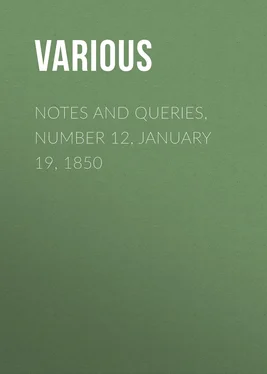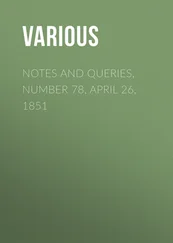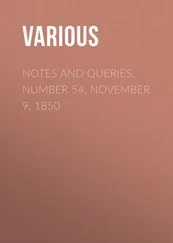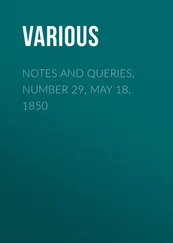Various - Notes and Queries, Number 12, January 19, 1850
Здесь есть возможность читать онлайн «Various - Notes and Queries, Number 12, January 19, 1850» — ознакомительный отрывок электронной книги совершенно бесплатно, а после прочтения отрывка купить полную версию. В некоторых случаях можно слушать аудио, скачать через торрент в формате fb2 и присутствует краткое содержание. Жанр: foreign_antique, periodic, foreign_edu, на английском языке. Описание произведения, (предисловие) а так же отзывы посетителей доступны на портале библиотеки ЛибКат.
- Название:Notes and Queries, Number 12, January 19, 1850
- Автор:
- Жанр:
- Год:неизвестен
- ISBN:нет данных
- Рейтинг книги:3 / 5. Голосов: 1
-
Избранное:Добавить в избранное
- Отзывы:
-
Ваша оценка:
- 60
- 1
- 2
- 3
- 4
- 5
Notes and Queries, Number 12, January 19, 1850: краткое содержание, описание и аннотация
Предлагаем к чтению аннотацию, описание, краткое содержание или предисловие (зависит от того, что написал сам автор книги «Notes and Queries, Number 12, January 19, 1850»). Если вы не нашли необходимую информацию о книге — напишите в комментариях, мы постараемся отыскать её.
Notes and Queries, Number 12, January 19, 1850 — читать онлайн ознакомительный отрывок
Ниже представлен текст книги, разбитый по страницам. Система сохранения места последней прочитанной страницы, позволяет с удобством читать онлайн бесплатно книгу «Notes and Queries, Number 12, January 19, 1850», без необходимости каждый раз заново искать на чём Вы остановились. Поставьте закладку, и сможете в любой момент перейти на страницу, на которой закончили чтение.
Интервал:
Закладка:
Various
Notes and Queries, Number 12, January 19, 1850
NOTES
ORIGIN OF A WELL-KNOWN PASSAGE IN HUDIBRAS
The often-quoted lines—
"For he that fights and runs away
May live to fight another day,"
generally supposed to form a part of Hudibras , are to be found (as Mr. Cunningham points out, at p. 602. of his Handbook for London ), in the Musarum Deliciæ , 12mo. 1656; a clever collection of "witty trifles," by Sir John Mennis and Dr. James Smith.
The passage, as it really stands in Hudibras (book iii. canto iii. verse 243.), is as follows:—
"For those that fly may fight again,
Which he can never do that's slain."
But there is a much earlier authority for these lines than the Musarum Deliciæ; a fact which I learn from a volume now open before me, the great rarity of which will excuse my transcribing the title-page in full:—
"Apophthegmes, that is to saie, prompte, quicke, wittie, and sentencious saiynges, of certain Emperours, Kynges, Capitaines, Philosophiers, and Oratours, as well Grekes as Romaines, bothe veraye pleasaunt and profitable to reade, partely for all maner of persones, and especially Gentlemen. First gathered and compiled in Latine by the right famous clerke, Maister Erasmus, of Roteradame. And now translated into Englyshe by Nicolas Udall. Excusam typis Ricardi Grafton , 1542. 8vo."
A second edition was printed by John Kingston, in 1564, with no other variation, I believe, than in the orthography. Haslewood, in a note on the fly-leaf of my copy, says:—
"Notwithstanding the fame of Erasmus, and the reputation of his translator, this volume has not obtained that notice which, either from its date or value, might be justly expected. Were its claim only founded on the colloquial notes of Udall, it is entitled to consideration, as therein may be traced several of the familiar phrases and common-place idioms, which have occasioned many conjectural speculations among the annotators upon our early drama."
The work consists of only two books of the original, comprising the apophthegms of Socrates, Aristippus, Diogenes, Philippus, Alexander, Antigonus, Augustus Cæsar, Julius Cæsar, Pompey, Phocion, Cicero, and Demosthenes.
On folio 239. occurs the following apophthegm, which is the one relating to the subject before us:—
"That same man, that renneth awaie,
May again fight, on other daie.
"¶ Judgeyng that it is more for the benefite of one's countree to renne awaie in battaile, then to lese his life. For a ded man can fight no more; but who hath saved hymself alive, by rennyng awaie, may, in many battailles mo, doe good service to his countree.
"§ At lest wise, if it be a poinet of good service, to renne awaie at all times, when the countree hath most neede of his helpe to sticke to it."
Thus we are enabled to throw back more than a century these famous Hudibrastic lines, which have occasioned so many inquiries for their origin.
I take this opportunity of noticing a mistake which has frequently been made concerning the French translation of Butler's Hudibras . Tytler, in his Essay on Translation ; Nichols, in his Biographical Anecdotes of Hogarth ; and Ray, in his History of the Rebellion , attributes it to Colonel Francis Towneley; whereas it was the work of John Towneley, uncle to the celebrated Charles Towneley, the collector of the Marbles.
EDWARD F. RIMBAULT.FIELD OF THE BROTHERS' FOOTSTEPS
I do not think that Mr. Cunningham, in his valuable work, has given any account of a piece of ground of which a strange story is recorded by Southey, in his Common-Place Book (Second Series, p. 21.). After quoting a letter received from a friend, recommending him to "take a view of those wonderful marks of the Lord's hatred to duelling , called The Brothers' Steps ," and giving him the description of the locality, Mr. Southey gives an account of his own visit to the spot (a field supposed to bear ineffaceable marks of the footsteps of two brothers, who fought a fatal duel about a love affair) in these words:—"We sought for near half an hour in vain. We could find no steps at all, within a quarter of a mile, no nor half a mile, of Montague House. We were almost out of hope, when an honest man who was at work directed us to the next ground adjoining to a pond. There we found what we sought, about three quarters of a mile north of Montague House, and about 500 yards east of Tottenham Court Road. The steps answer Mr. Walsh's description. They are of the size of a large human foot, about three inches deep, and lie nearly from north-east to south-west. We counted only seventy-six, but we were not exact in counting. The place where one or both the brothers are supposed to have fallen, is still bare of grass. The labourer also showed us the bank where (the tradition is) the wretched woman sat to see the combat."
Mr. Southey then goes on the speak of his full confidence in the tradition of their indestructibility, even after ploughing up, and of the conclusions to be drawn from the circumstance.
To this long note, I beg to append a query, as to the latest account of these footsteps, previous to the ground being built over, as it evidently now must be.
G.H.B.ON AUTHORS AND BOOKS, NO. 4
Verse may picture the feelings of the author, or it may only picture his fancy. To assume the former position, is not always safe; and in two memorable instances a series of sonnets has been used to construct a baseless fabric of biography.
In the accompanying sonnet, there is no such uncertainty. It was communicated to me by John Adamson, Esq., M.R.S.L., &c., honourably known by a translation of the tragedy of Dona Ignez de Castro , from the Portuguese of Nicola Luiz, and by a Memoir of the life and writings of Camoens , &c. It was not intended for publication, but now appears, at my request.
Mr. Adamson, it should be stated, is a corresponding member of the Royal Academy of Sciences of Lisbon, and has received diplomas of the orders of Christ and the Tower-and-Sword. The coming storm alludes to the menace of invasion by France.
"O Portugal! whene'er I see thy name
What proud emotions rise within my breast!
To thee I owe—from thee derive that fame
Which here may linger when I lie at rest.
When as a youth I landed on thy shore,
How little did I think I e'er could be
Worthy the honours thou has giv'n to me;
And when the coming storm I did deplore,
Drove me far from thee by its hostile threat—
With feelings which can never be effaced,
I learn'd to commune with those writers old
Who had the deeds of they great chieftains told;
Departed bards in converse sweet I met,
I'd seen where they had liv'd—the land Camoens grac'd."
I venture to add the titles of two interesting volumes which have been printed subsequently to the publications of Lowndes and Martin. It may be a useful hint to students and collectors:—
"BIBLIOTHECA LUSITANA, or catalogue of books and tracts, relating to the history, literature, and poetry, of Portugal: forming part of the library of John Adamson, M.R.S.L. etc. Newcastle on Tyne , 1836. 8vo.
"LUSITANIA ILLUSTRATA; notices on the history, antiquities, literature, etc. of Portugal. Literary department. Part I. Selection of sonnets, with biographical Sketches of the author, by John Adamson, M.R.S.L. etc. Newcastle upon Tyne , 1842. 8vo."
BOLTON CORNEY.RECEIPTS TO THE BEGGAR'S OPERA ON ITS PRODUCTION
Интервал:
Закладка:
Похожие книги на «Notes and Queries, Number 12, January 19, 1850»
Представляем Вашему вниманию похожие книги на «Notes and Queries, Number 12, January 19, 1850» списком для выбора. Мы отобрали схожую по названию и смыслу литературу в надежде предоставить читателям больше вариантов отыскать новые, интересные, ещё непрочитанные произведения.
Обсуждение, отзывы о книге «Notes and Queries, Number 12, January 19, 1850» и просто собственные мнения читателей. Оставьте ваши комментарии, напишите, что Вы думаете о произведении, его смысле или главных героях. Укажите что конкретно понравилось, а что нет, и почему Вы так считаете.












